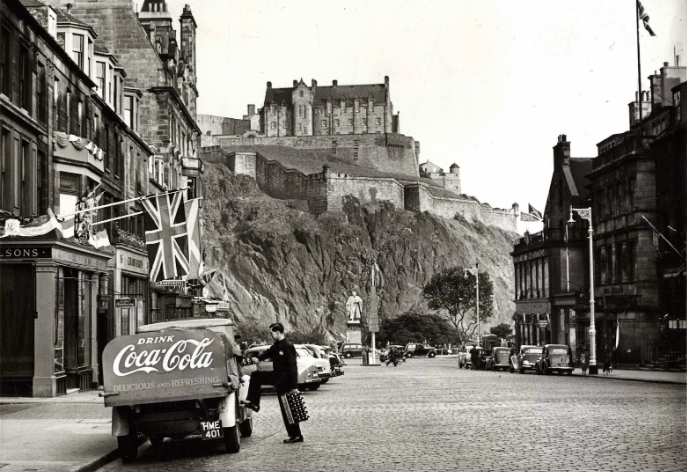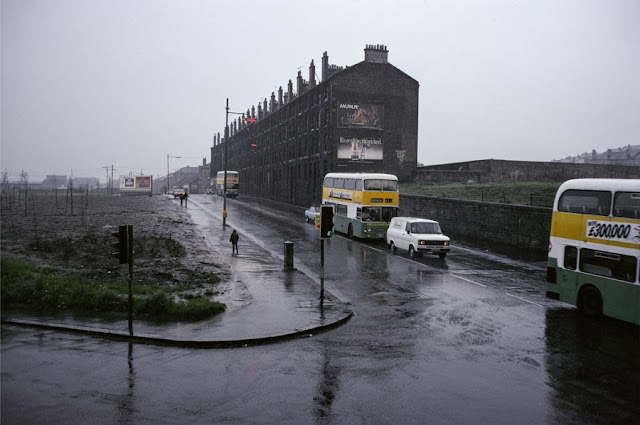The Teddy Boys were a flashily dressed, rebellious and sometimes violent youth movement that originated in Britain in the 1950s. The three-quarter-length Edwardian jacket with velvet collar, drainpipe trousers and quiff became a focus of male fashion which still holds cult status today.

The invention of the ‘teenager’ in the 1950s was a global, almost simultaneous phenomenon. Defined by groups of youths rebelling against the expectations of their parents and wider society in their behavior, attitudes and clothing, movements sprang up in America, Australia, Japan and beyond. Identifiable by their clothes and the music they’d play, these youths reveled in a post-war freedom not enjoyed by the previous generation.
In the United Kingdom, one facet of this newly emerging youth culture was working class youngsters adopting the formal and flamboyant tailoring of Edwardian dress. Known as the ‘Teds’ their jackets – often sumptuous velvets – had wide notched lapels accessorized with a skinny tie or bootlace, and they wore brothel creeper shoes on their feet. “The Ted swaggered with it all out front, male sexuality overt,” wrote journalist Richard Smith. As well as a way of dress and a style of music, owing to several high-profile incidents, the Teds were also associated with wayward and yobbish behavior and public fights that led them to being banned from some venues.

Between 1976 and 1979 Chris Steele-Perkins, working with the writer Richard Smith, documented the phenomenon of Ted culture across the UK in a series of striking black and white photographs.
“A lot of the iconography of the Teds is obviously borrowed from America, but it didn’t manifest itself in America in the same way,” said Steele-Perkins. “They didn’t mind a bit of a fight every now and again, so they quickly established themselves as a menace to society. They were strutting their stuff on the street corners of Britain, and scaring old ladies.”

Steele-Perkins went beyond simply capturing the distinctive fashion of the movement by documenting the Teds interacting in the environs of the dance hall, the pub, the suburban home, car parks and seaside promenades. The series quickly became a classic of British social documentary photography.

Captivating Monochrome Images of Teddy Boys During the Mid-1970s

Captivating Monochrome Images of Teddy Boys During the Mid-1970s

Captivating Monochrome Images of Teddy Boys During the Mid-1970s

Captivating Monochrome Images of Teddy Boys During the Mid-1970s

Captivating Monochrome Images of Teddy Boys During the Mid-1970s

Captivating Monochrome Images of Teddy Boys During the Mid-1970s

Captivating Monochrome Images of Teddy Boys During the Mid-1970s

Captivating Monochrome Images of Teddy Boys During the Mid-1970s

Captivating Monochrome Images of Teddy Boys During the Mid-1970s

Captivating Monochrome Images of Teddy Boys During the Mid-1970s

Captivating Monochrome Images of Teddy Boys During the Mid-1970s

Captivating Monochrome Images of Teddy Boys During the Mid-1970s

Captivating Monochrome Images of Teddy Boys During the Mid-1970s

Captivating Monochrome Images of Teddy Boys During the Mid-1970s

Captivating Monochrome Images of Teddy Boys During the Mid-1970s

Captivating Monochrome Images of Teddy Boys During the Mid-1970s

Captivating Monochrome Images of Teddy Boys During the Mid-1970s

Captivating Monochrome Images of Teddy Boys During the Mid-1970s

Captivating Monochrome Images of Teddy Boys During the Mid-1970s

Captivating Monochrome Images of Teddy Boys During the Mid-1970s

Captivating Monochrome Images of Teddy Boys During the Mid-1970s

Captivating Monochrome Images of Teddy Boys During the Mid-1970s

Captivating Monochrome Images of Teddy Boys During the Mid-1970s

Captivating Monochrome Images of Teddy Boys During the Mid-1970s

Captivating Monochrome Images of Teddy Boys During the Mid-1970s

(Photos © Chris Steele-Perkins / Magnum Photos)


-1705401211.jpg)
-1706160726.jpg)